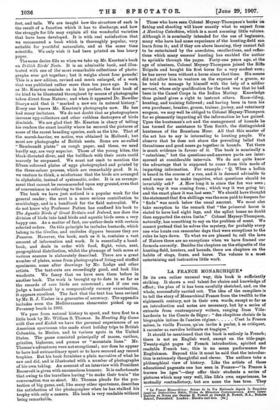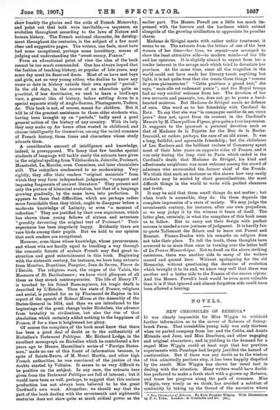LA. FRANCE MONARCHIQUE.* IN its own rather unusual way, this
book is sufficiently striking. It shows a real talent for choice and knowledge of effect; the plan of it has been carefully sketched, and, on the whole, successfully carried out. The idea of the compilers is to tell the story of Monarchical France from the twelfth to the eighteenth century, not in their own words, except so far as an introduction and notes are necessary, but by a series of extracts from contemporary writers, ranging from Ville- hardouin to the Comte de SAgur "des ohapitres choisis de la
biographie intime de l'ancien regime.- (Test in France meme, la vieille France, qu'on invite h parler, b. se critiquer, I raconter sa carriere brill:lobe et tragique."
It should be mentioned that the book is entirely in French; there is not an English word, except on the title-page. Twenty-eight pages of French introduction, spirited and readable French too; this is no mean performance for Englishmen. Beyond this it must be said that the introduc- tion is extremely thoughtful and clever. The authors take a philosophical view of history. Like the artiste of those educational pageants one has seen in France—" la France 1 travera lea dges "—they offer their students a series of pictures which may very well, like life's own experiences, be mutually contradictory; but are none the less true. They
• La Frame Monarchiqu Sarin de la Vie Nationals &pas 7* Dourilme jusqu'au Diskultiests mia., Tire. de Mhnoirda Contemporain*. Ave° Intro- duction et Notes par George H. Powell et Oswald B. Powell, B.A., Bedlam School, Psterstleld. London: Blackle and Son. [84.]
show frankly the glories and the evils of French Monarchy, and 'point out that both were inevitable,—a sequence, an evolution throughout according to the laws of Nature and human history. The French national character, its develop- ment:throughout the centuries, is the subject of a few most clear and suggestive pages. The writers, one feels, must have bad some exceptional, perhaps some hereditary, means of judging and understanding the "sweet enemy, France."
From an educational point of view the idea of the book cannot be too much commended. One has always hoped that the fashion of teaching history, so popular of late years, may some day meet its deserved doom. Most of us have met boys and girls, not so very young either, who decline to know any name or date in history outside their own special "period." In the old days, in the course of an education quite as practical, if less doctrinaire, we used to learn a bird's-eye view, a general idea of history, before settling down to a special separate study of;Anglo-Saxons, Plantagenet's, Tudors, &c. This book is not, of course, meant for children. But it will be of the greatest assistance to those older students who, haring been brought up on "periods," badly need a good general notkin of the history of any country. With its help they may make up for hours often wasted in childhood, and choose 'intelligently for themselves, among the varied romance Of French history, those times and characters whose study attracts them.
A considerable amount of intelligence and knowledge, indeed; is presupposed. We fancy that few besides special students of language will tackle easily the extracts here given in the original spelling from Villehardouin, Joinville, Froissart, Monstrelet, La Marche, even Commines, and later chroniclers still. The cavilers condescend to no modernising. Very rightly, they, offer their readers "original materials" from which they may form independent judgments, "compact and imposing fragments of ancient literature." They present not only the picture of historical evolution, 'but that of a language growing , gradually, by the same laws, into perfection. It appears to them that difficulties, which are perhaps rather more formidable than they think, ought to disappear before a moderate knowledge of Latinity, or even "a moment of reflection." They are justified by their own experience, which has shown them young fellows of sixteen and seventeen "greedily devouring the original text of Froissart." Their experience has been singularly happy. Evidently there are 'rare birds among their pupils. But we hold to our opinion that such readers are exceptional.
However, even those whose knowledge, whose perseverance, and whose wits are hardly equal to breaking a way through the romantic forests of archaic French may find great in- struction and good entertainment in this book. Beginning with the sixteenth century, for instance, we have long extracts from Montlua, Biantfone, Pannier, Jean de Seizes, Pierre de l'Estoile. The religious wars, the reigns of the Valois, the Massacre of St. Bartholomew; we have vivid glimpses of all these as they struck contemporaries. The life of Henry IV. is touched by his friend Bassompierre, his tragic death is described by L'Estoile. Then the state of France, religious and social, is painted for us by Florimond de Rapine in his report of the speech of Robert Miron at the Assembly of the States-General in 1614, and thus we are introduced to the beginnings of the great change 'under Richelieu, the advance from brutality to civilisation, hut also the rise of that absolutism which certainly added nothing to the happiness of France, if for a time it heightened her glory.
Of course the compilers.of the book must know that there has been a good deal of doubt as to the authenticity of Richelieu's Testament Politique. Mr. Richard Lodge, in the excellent monograph on Richelieu which he contributed a few years ago to Messrs. Macmillan's series of "Foreign States- men: made no use of this fount of information because, in spite of Sainte-Beuve, of M. Henri Martin, and other high French authorities, he was convinced of the justice of the doubts started by Voltaire. It seems to us very difficult to be positive on the subject. In any case, the extracts here given from the Testament Politique are full of interest; but it would have been as well, perhaps, to suggest that this curious production has not always been believed • to be the great Cardinal's own • work. Altogether, we should say that the part, of the book dealing with the seventeenth and eighteenth centuries does not show gulls so much. critical power as the
earlier part. The Messrs. Powell are a little too much pressed with the horrors and the hardness which existed alongside of the growing civilisation to appreciate its peculiar charm.
Madame de Sevigne meets with rather unfair treatment, it seems to us. The extracts from the letters of one of the best women of her time—her time, we repeat—are arranged to show the least attractive side—to modern minds—of her life and her opinions. It is slightly absurd to expect from her a tender interest in the savage mob which tried to devastate her province. At the same time, since all the tragedies in the world could not have made her literary touch anything but light, it is not quite true that she treats these things "comma de puree plaisanteries." " Cette province a grand tort," she says, " mais elle est rudement punie "; and the Royal troops had no very cordial welcome from her. The devotion of her own servants and peasants, too, does not go to prove a hard- hearted mistress. But Madame de Sevigne needs no defence of ours. One word as to her friendship with Cardinal de Retz. To say that she was "la compagne assidue de sea vieuz jours" does not, apart from its context in the Cardinal's Memoir by M. Champollion-Figeac, give quite a tine impression. It suggests to the ignorant a personal devotion such as that of Madame de la Fayette for the Due de la Roche- foucauld, or rather, perhaps, the care of an old nurse. It was a long, faithful, and agreeable friendship; but the date:cline of Les Rochers and the brilliant recluse of Commercy spent most of their later years on opposite sides of France. and it was only during the long visit to Paris which ended in the Cardinal's death that Madame de Sevign6, his kind and affectionate neighbour, was most welcome among the crowd of admirers who surrounded the former chief of the Fronde. We think that such an instance as this shows bow very easily students may be misled by short generalisations, the most difficult things in the world to write with perfect clearness and truth.
It may be said that these small things do not matter ; but when truth is accessible, they do. On them depends the complete impression of a state of society. We may judge the seventeenth century, for instance, after our own prejudices, or we may judge it by the witness it bears of itself. The latter plan, certainly, is what the compilers of this book mean us to follow. But to carry out their design with perfect success is needed a rare justness of judgment. It is hardly fair to quote Tallemant des Reauz and to leave out Pascal and Bossuet. Pineau-Duclos with his remarks on religion does not take their place. To tell the truth, these thoughts have occurred to us more than once in turning over the latter half of La Prance Monarchique. Not to dwell on the above striking omissions, there was another side to many of the writers named and quoted here. Without apologising for the old Monarchy, without questioning the doctrine of evolution which brought it to its end, we know very well that there was another and a better side to the France of the ancien regime. And the Messrs. Powell's book would be even more valuable than it is if that ignored and almost forgotten side could have been allowed a hearing.

















































 Previous page
Previous page